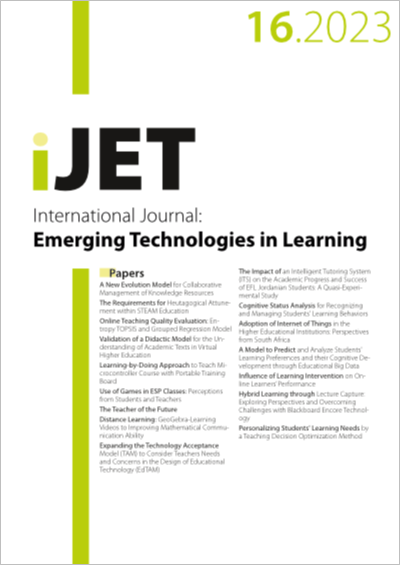The Impact of an Intelligent Tutoring System (ITS) on the Academic Progress and Success of EFL Jordanian Students: A Quasi-Experimental Study
DOI:
https://doi.org/10.3991/ijet.v18i16.41471Keywords:
Keywords: English as a foreign language, ITS, lexical knowledge, reading comprehension, , instructional technologyAbstract
This study’s objective was to investigate the impact that using an Intelligent Tutoring System (ITS) had on the English language abilities of English as a Foreign Language (EFL) students from Jordan who were enrolled in university-level programs. Sixty students from Jadara University in Jordan were chosen at random and assigned to one of two groups: an experimental group that got instruction based on ITS or a control group that received education in a more traditional classroom setting. Both groups were shown content for a total of 12 hours spread out over four weeks. Participants in the study who were given an education based on ITS showed significant gains in both their learning and their performance after receiving this kind of instruction. The post-test results of the experimental group in grammar, vocabulary, and reading comprehension were significantly better than the findings of the control group. Additionally, individuals in the experimental group reported higher levels of happiness with the training when compared to those in the control group. The findings of this study suggest that integrating an ITS into EFL instruction may prove to be an effective method for boosting the learning and performance of students studying EFL at institutions located in Jordan. This has enormous implications for the future of the development and implementations of instructional technology in EFL classrooms.
Downloads
Published
How to Cite
Issue
Section
License
Copyright (c) 2023 luqman Rababah

This work is licensed under a Creative Commons Attribution 4.0 International License.



